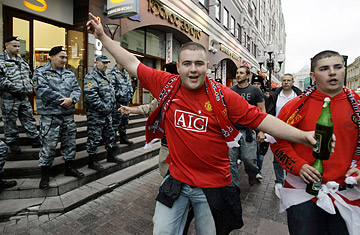
Fans of the English soccer team Manchester United walk on Arbat Street in downtown Moscow, prior to their team's appearance in the Champions League Final against rival Chelsea.
"The day is lost for business," grumbled a top Russian banker on Wednesday. His sentiment may have been shared, at the end of the day, by Russian oligarch Roman Abramovich, whose London-based soccer team Chelsea was beaten 6-5 on penalty kicks by Manchester United in the European Champion's League final played in the Russian capital. But the banker's complaint was simply that he had no way to move around the Moscow to keep appointments, given the traffic restrictions all over the city to allow smooth passage for the 970 special buses whisking Chelsea and United fans, separately, from airports to specially equipped "fan towns" at opposite ends of the mammoth Luzhniki stadium. All serious business in the city would cease by 4 p.m., the banker continued; it just didn't make sense to carry on working with this lunacy in town.
Business was better, however, for cafes and pubs equipped with large TV screens. Russian fans, short of the $790 to to $4730 needed to buy a Luzhniki ticket, had booked all the city and suburban joints well in advance, eager to catch every detail of the biggest sports even staged in Moscow since the 1980 Olympics. Inevitably, it produced a bizarre mix of politics and business, diplomacy and security, sports and ideology.
It has become a habit in Vladimir Putin's Russia to splash cash on sports events, using them them to boost the nation's morale in the tradition of the Soviet Union in its heyday. And there was certainly an opportunity for crowing, just last week, when Russia's Zenit St. Petersburg won a 2-0 victory over Glasgow Rangers in the UEFA Cup Final staged in Manchester. That trophy may be a lesser tournament than the Champion's League, but that didn't stop both Prime Minister Putin and his President-consort Dmitri Medvedev from celebrating Zenit as if it had defended Mother Russia against foreign aggression. In the same week, a second opportunity to whip up national hysteria came when Russia defeated Canada to win ice hockey's World Championship for the first time since 1993. And Putin continues to pour funds into his pet project of holding the 2014 Winter Olympics in the Russian Black Sea resort Sochi.
The venue of the Champions League Final is selected more than a year ahead, and having a match contested by two English teams was a win-win proposition for Putin's program of boosting Russia's stature through sport.
A potential PR disaster was averted by President Medvedev issuing a decree to automatically grant visas to all British fans holding a valid ticket to the game. Obtaining visas had become more difficult in recent months as Moscow-London relations sank to a low ebb in a series of tit-for-tat moves following Britain rejecting Russia's demands to extradite tycoon Boris Berezovsky and Chechen separatist Akhmed Zakayev, while Russia turned down British demands to extradite Andrei Lugovoi, prime suspect in the murder of former Russian security officer Aleksander Litvinenko. It would be premature, however, to judge the blanket visa approval as signaling a thaw in relations, rather than simply a necessary move to remain onside with European soccer authorities. This week, Russian security offficials again raided the Moscow headquarters of the British oil company BP, whose operation and holdings in Russia are coveted by Russia's hydrocarbon state.
Despite issuing them visas, the Moscow authorities were not about to give some 42,000 British soccer fans — a group who have, rightly or wrongly, earned a questionable record for maintaining public order — the keys to the city. Some some 15,000 policemen were deployed to maintain crowd control, while the Chelsea and United fans were segregated both from one another and, as far as possible. Their charter flights landed at different airports, and most were taken directly to separate fan stockades connected to the stadium by special galleries to prevent any mixing. Alcohol sales at the stadium were banned on the night of the game. And last but not least, the Russian authorities preemptively locked up some particularly notorious Russian neo-Nazis, who had previously been responsible for deadly attacks on foreigners, although they had hitherto hardly been a priority of law enforcement.
All over the city, squads of anxious riot police manned street corners as Chelsea and United fans — easily distinguished by their, respectively, blue and red-and-white regalia — strolled the streets, drinking beer and riding the famous Moscow subway. In Red Square, a football pitch had been set up right by Lenin's tomb, and Russian and British fans played pickup games under a bizarre combination of Bolshevik stars and Imperial eagles. The combination of official goodwill and vigilance appears to have been successful — just a single brawl among the Russian and British fans was reported throughout the day.
Official commentators covering the match tried drumming up Russian support for Chelsea on the grounds of it being owned by oligarch Abramovich, which, they suggested would mean it could bring Russia a victory by proxy. But the proxy result was a defeat. Much as connoisseurs enjoyed the often dramatic match, a touch of bitterness lingered. A friend summed it up succinctly: "That's what Abramovich spent a billion dollars on? To buy these blue-clad fumblers? What a waste of our money!"
